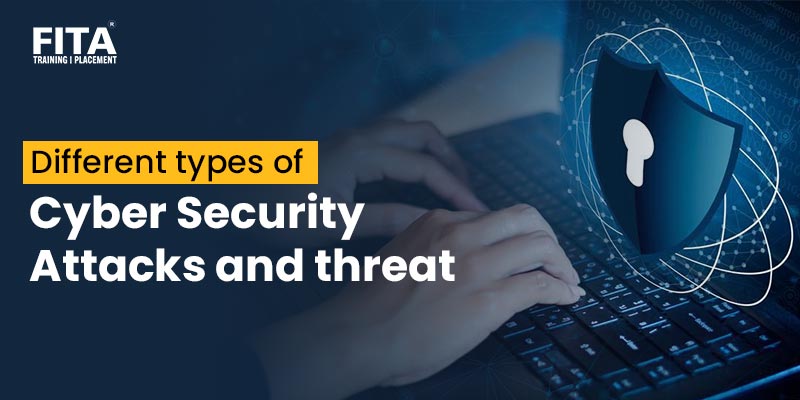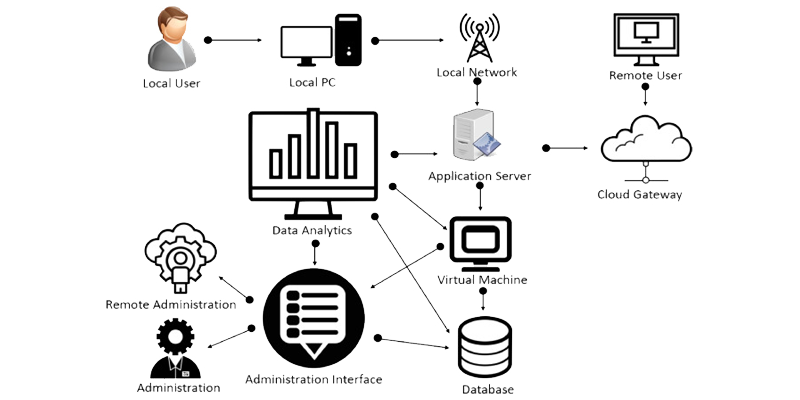
In today’s interconnected world, the prevalence of cyber threats and attacks has become a critical concern for individuals, organisations, and governments alike. The rapid advancement of technology has introduced new avenues for malicious actors to exploit vulnerabilities and compromise sensitive information. This blog aims to provide an extensive overview of various types of cyber security attacks and cyber threats, shedding light on their characteristics, potential impacts, and recommended countermeasures. By understanding the nature of these cybersecurity threats, we can empower ourselves and bolster our defences to safeguard the digital realm.
Join Cyber Security Course in Bangalore at FITA Academy and start learning about cybersecurity, which is an upcoming mainstream job opportunity for recent graduates as well as the experienced.
Social Engineering Attacks
Cyberattacks of the social engineering variety target human behaviours rather than technical flaws. These assaults are intended to trick users into disclosing private information or taking a step that could be dangerous for them or their company. Some of the most typical forms of social engineering attacks are phishing, spear phishing, and whaling.

A form of social engineering attack known as phishing involves the perpetrator sending an email that looks to be from a trustworthy source, such as a bank or an online merchant, and requesting that the receiver divulge personal information like login passwords or credit card numbers. In order to make the email appear more credible, spear phishing, a more focused variation of phishing, entails investigating the victim’s personal information.
Whaling is an illustration of a social engineering attack that targets high-profile individuals, such as executives or celebrities. The attacker poses as a trusted authority figure, such as a lawyer or a government official, and requests sensitive information or payment for a fake service.
To fend off these kinds of assaults, It is crucial to inform staff members about the dangers of social engineering and to implement strong security policies and procedures. Organisations can also use technology solutions like spam filters and two-factor authentication to protect against phishing attacks. When receiving, it is crucial to use caution against unsolicited emails or messages and to check the authenticity of any number of requests for sensitive information before responding.
Malware-Based Attacks
Malware-based attacks are a types of cyber threats that involves the use of malicious software to compromise a victim’s computer or network. Ransomware, botnets, and Trojan horses are some of the most common types of malware-based attacks.
A form of malware known as ransomware encrypts a victim’s files and demands money in return for the decryption key.Such an assault can be disastrous for both people and businesses because it may lead to the loss of important data and expensive costs.
Botnets, or networks of compromised computers, are managed by a central command and control server. DDoS attacks and spam campaigns are just two examples of the destructive actions that can be carried out on these networks.
A Trojan horse is malware that poses as a trustworthy programme but actually contains harmful code that can infiltrate the victim’s network or computer. Sensitive data can be stolen, or unauthorised access to a victim’s system can be obtained through this kind of attack.
It’s crucial to keep software-upgraded operating systems with the newest security patches and to use anti-malware software to find and get rid of harmful programs to defend against this kind of attack. Additionally, it is crucial to exercise caution while downloading and installing software from unreliable sources, as well as to refrain from opening shady email attachments or clicking on links from untrusted websites. The effects of a ransomware attack might also be lessened by regular backups of crucial data.
The Ethical Hacking Course in Chennai provides knowledge in basic to advanced types of hacking methods. Join FITA Academy and be a professional ethical hacker.
Network-Based Attacks
Network-based attacks are a type of cyber attack that target the infrastructure of a victim’s network or system. Distributed Denial of Service (DDoS), Man-in-the-Middle (MitM), and Some of the most prevalent types of network-based attacks include SQL Injection.

A DDoS attack involves overwhelming a victim’s network or website with traffic from multiple sources, making it unavailable for legitimate users. A botnet, or network of infected computers controlled by the attacker, can be used to carry out this kind of attack.
A Man-in-the-Middle (MitM) attack involves intercepting communications between two parties to eavesdrop on or modify the communication. This style of assault can be executed by intercepting unencrypted traffic or by using techniques like ARP spoofing to redirect traffic to the attacker’s system.
SQL Injection is an attack which targets web applications that use SQL databases. The attacker injects malicious code into the application’s input fields, which can be used to extract sensitive information or modify the database.
To identify and stop unwanted traffic, it’s critical to establish robust network security measures like firewalls and intrusion detection systems. By ensuring that communications are safe, encryption can also assist in defending against MitM attacks. Regular vulnerability scans and penetration testing can assist in locating and addressing potential SQL Injection attack vulnerabilities in web applications. And to reduce the effects of a DDoS assault and expeditiously resume normal operations, it is also crucial to have a response strategy in place.
Physical Attacks
Physical attacks are a types of cyber attacks that involves gaining physical access to a victim’s premises or devices. USB Dropping, Dumpster Diving, and Tailgating are some of the most common types of physical attacks.
USB Dropping involves leaving infected USB drives through parking lots or in coffee cafés in public in the hopes that someone will pick them up and plug them into their computer. Once plugged in, the malware on the USB drive can infect the victim’s computer and compromise their data.
What is Hacking? Understanding Legal and Illegal Hacking:
Hacking involves gaining unauthorised access to computer systems or networks, but there’s a crucial difference between the two types. Many people don’t know what is hacking. Legal hacking, also known as ethical hacking, is conducted by authorised professionals to find vulnerabilities and enhance cybersecurity. Illegal hacking, on the other hand, involves unauthorized access for malicious purposes, like theft or disruption, and is strictly against the law. It’s essential to know this distinction in our digital age, where illegal hacking can have severe consequences while legal hacking helps protect our online world.
The Ethical Hacking Course in Bangalore will help you learn about different hacking methods and their prevention. It is apt for both freshers and experienced candidates who want to learn about ethical hacking
Dumpster Diving involves searching through a victim’s trash to find sensitive information, such as passwords or account numbers. This method of attack can be particularly effective if the victim does not properly dispose of confidential information or uses weak passwords.
Tailgating involves following an authorised person into a secure area by closely following them through a locked door or gate. Once inside, the attacker can access sensitive information or steal valuable assets.
Strong network security measures must be put in place to prevent these assaults, such as firewalls additionally to intrusion detection systems, which can spot and block harmful activity and stop malicious activity. By ensuring that communications are safe, encryption can also assist in defending against MitM attacks. Regular vulnerability scans and penetration testing can assist in locating and addressing potential SQL Injection attack vulnerabilities in web applications.
Advanced Persistent Threats (APTs)
Advanced Persistent Threats (APTs) are a type of cyber attack that involves a prolonged and targeted effort to compromise a victim’s network or system. APTs use a combination of advanced malware, zero-day exploits, and advanced reconnaissance techniques to achieve their objectives.

Advanced malware is designed to evade detection by traditional anti-virus software and can be used to steal sensitive information or to gain unauthorised access to a victim’s system. Zero-day exploits are vulnerabilities in software or hardware, Something the vendor is unaware of, and and that is used to increase access to a victim’s system.
Advanced reconnaissance techniques involve gathering information about a victim’s network and system to identify potential vulnerabilities and targets. This can involve techniques like social engineering, phishing, and spear-phishing to gather information about employees and their access privileges.
To defend against APTs, it is important to put in place powerful security safeguards like firewalls and intrusion detection systems, and anti-malware software to detect and block malicious activity. Regular vulnerability scans and penetration testing can help identify and address potential vulnerabilities in software and hardware. Employee education and awareness training can also help prevent social engineering and phishing attacks. A reaction strategy needs to be in place to swiftly identify, lessen the effects of an APT, and fast return operations to normal.
The Cyber Security Course in Chennai at FITA Academy consists of real-time projects and scenarios that will make you an efficient analyst. Join the course and learn more about cybersecurity.
Individuals and businesses need to be more knowledgeable about the many cybersecurity threats and attacks that exist nowadays Advanced Persistent Threats (APTs) are cybersecurity threats that involve a prolonged and targeted effort to compromise a victim’s network or system using advanced malware, zero-day exploits, and advanced reconnaissance techniques. Physical attacks, such as USB Dropping, Dumpster Diving, and Tailgating, involve gaining physical access to a victim’s premises or devices. Attacks that target a victim’s network or system’s infrastructure include Distributed Denial of Service (DDoS), Man-in-the-Middle (MitM), and SQL Injection. In order to swiftly detect and lessen the effects of a cyber-attack and resume normal operations, it is also crucial to have a response strategy in place.
